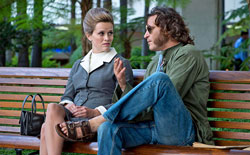Three things need to be understood before seeing Inherent Vice. 1) The film is not about plot or conventional emotions. 2) The pacing is deliberate. 3) The film is as stoned as its central character.
I don’t mean that the film makes you feel stoned. Inherent Vice is seductive, but despite a lot of the film’s subject, not in the sexual sense. It’s seductive in that the film’s atmosphere, style, humor and liveliness is so enticing that you don’t want it to end.
The film was adapted from the 2009 Thomas Pynchon novel of the same name by Hollywood wunderkind Paul Thomas Anderson (Boogie Nights, There Will Be Blood).
People might ask what the film is about. What does it matter? It centers on jaded pot-loving hippie/private detective Larry “Doc” Sportello (Joaquin Phoenix). His ex-girlfriend, Shasta (Katherine Waterson) reappears in his life, asking Doc to prevent a plot by her boyfriend’s wife with the help of her lover to put him in an asylum…
…which leads to a murder, the police framing Doc, another murder, drug smuggling, neo-nazis, more murder, and a paranoia of authority typical of that late 60s daze. Groovy man, but what were we talking about again?
The plot is purposely incomprehensible. That’s the main complaint against it: “If there’s no plot, what’s left?” What is left is a surplus of attitude and personality, which Inherent Vice is all about. The film functions as a mix of the 1946 classic The Big Sleep and the 1973 Robert Altman film The Long Goodbye. The former because of the film’s emphasis on atmospheric, individual scenes over coherence, and the latter for its sprawling nature and subversive world portrait.
However, Inherent Vice is almost anti-detective, like the Gene Hackman film Night Moves. Here, Doc Sportello goes around and talks to, questions, coaxes and insults a motley crew of FBI agents, nymphos, neo-nazis, and dopeheads, which leads him closer to… where again? It’s what this colorful assortment of people say, and how they say it, and how they react to what they say that makes the film interesting.
It’s stoned in that it doesn’t know where it’s going. The film’s pace is slow, almost meandering, which isn’t a criticism but an appraisal. Where Anderson used to solve his pacing problems with dramatic track ins, swish pans and match cuts, here he opts for long takes that can last about five or six minutes long, often choosing to move the camera into his subjects with such subtle grace that you don’t realize the camera’s moving until entire parts of a character’s body are missing from view.
The pacing allows Anderson to establish the “anything goes” attitude that makes the film so joyful to watch. We soak up all the little things now. The 1970s are established not through obvious music choices, like American Hustle, but through set design, costuming, and dialogue. This is the core of Inherent Vice’s colorful personality. I didn’t care about what was happening or who did it, regardless of not knowing who “who” is and what it is they “did.” I was more excited seeing these characters tripping over their words expressing themselves, talking about their memories, their hang ups, their dreams.
“Anything goes” also explains what the film thinks of itself, in that it doesn’t take itself seriously. Nothing is overdone, and the characters take everything in their stride. People declare themselves drug addicts and neo-nazis as easily as they eat and drink. This aspect makes the film’s strangeness easier to swallow and also quite funny in many of the scenes.
The casting is brilliant, and the contribution to the texture of the film by the actors elevates the film above Anderson’s others. Josh Brolin plays the cop “Bigfoot,” whose hilarious anger seeps out from frustrating situations, such as kicking doors down, to mundane situations, like ordering pancakes. Owen Wilson plays the human chameleon, a dopehead who infiltrates subversive groups in plain view. Benicio del Toro plays a disloyal lawyer, who is disloyal out of practicality and not vengeance. Jena Malone plays a recovering drug addict, and also forms the backbone to one of the film’s funniest scenes.
Inherent Vice might be received in the same way Tarantino’s Jackie Brown was: “Too slow, too meandering, etc.” I disagree with this assertion. The two are similar, but beyond aesthetic touches. Both films are the most mature visions both directors have had. Inherent Vice is a film to be savored, so rich in personality and atmosphere that in several moments when I thought the film would end and it didn’t, I was overjoyed. I wanted these characters to talk and plan and misdirect each other for hours more before the credits rolled.
IMAGE TAKEN from insidemovies.ew.com



